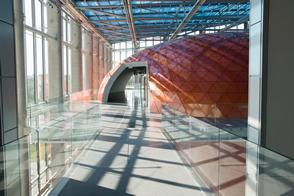
Dr Zsolt Fülöp, Chair of the National Research Infrastructure Committee
“State funds should be spent on funding membership in international infrastructures that contribute to the competitiveness of the Hungarian research community, and thus bring significant benefits to Hungary.”
The National Research, Development and Innovation Office (NRDI Office) is a member of several international research infrastructures and an active participant in several professional collaborations and policy-making organisations, thus helping to integrate Hungarian RDI professionals into the international research and innovation community. In connection with the 2021 update of the European Strategy Forum on Research Infrastructures (ESFRI) Roadmap, Hungary joined two existing international research infrastructures, and with the support of the NRDI Office, Hungarian research communities were able to engage in the preparatory phases of three newly launched European research infrastructure initiatives. Further accessions are expected in relation to the preparation of the ESFRI Roadmap 2026.
The NRDI Office will ensure, through chapter-managed appropriations, the affiliation to international research infrastructures and organisations and the payment of membership fees for participation. In addition to central budget contributions, the aim is for the research centres and higher education institutions involved in international research infrastructures to cover as much of the membership fees as possible from their own resources, and to make full use of the opportunities offered by in-kind contributions.
The fees for membership of international professional organisations for RDI purposes and the cost of access to research infrastructures amount to approximately HUF 13.5 billion per year in the budget of the NRDI Office, of which ELI ERIC, as an international research infrastructure of key importance for Hungary, receives HUF 7.2 billion.
In order to ensure the proper and effective utilisation of funds, the NRDI Office considers it a priority to continuously monitor and review the benefits of its memberships by looking at achievement and expenditure in the specific R&D fields, and to ensure that the resulting public benefits are not only enjoyed by the beneficiaries but also by the wider research community, society and decision-makers responsible for science funding.
European cooperation in developing research infrastructures
Founded by the European Commission in 2002, the European Strategy Forum on Research Infrastructures (ESFRI) is an important instrument in European scientific integration. It aims to strengthen the coherence and strategic approach of the EU’s RDI policy on RDI and to launch initiatives promoting the more efficient use of RIs. The most recent update of the ESFRI Roadmap in 2021 (the ESFRI Roadmap 2021) defined the development framework for research infrastructures of pan-European importance for the coming years. The document sets the objective that projects new should be completed in ten years, should be realistically sustainable, and should ensure maximum ROI from the perspectives of science, innovation, education, socio-economic benefits and competitiveness. Several of the 22 projects and 41 landmarks in the document have been implemented with Hungarian contribution, and/or Hungarian researchers benefit from the membership.
The function of the National Research Infrastructure Committee
The National Research Infrastructure Committee (NKIB) supports the NRDI Office in fulfilling its public mandate to ensure the sustainable development and international integration of Hungary’s research infrastructures. The NKIB is a body composed of experts from the Hungarian scientific community and is structured according to the scientific domains defined by ESFRI (Energy; Environment; Health and food; Physical sciences and engineering; Social and cultural innovation; Data, computing and digital research).
It participates in the development of the methodology underpinning the mapping of domestic research infrastructures, the assessment of development needs, the planning of collaborations with foreign research infrastructures and the continuous monitoring of scientific performance.
National Research Infrastructure Roadmap, 2018
Coordinated by the NRDI Office and with the professional contribution of the NKIB, the National Research Infrastructure Roadmap was published in 2018. The document presents the state of Hungarian research infrastructures and infrastructure networks, Hungary’s participation in and connection to international research infrastructures, major infrastructure development projects, and the criteria for monitoring and evaluating infrastructures to support further development. The document is available in both English and Hungarian on the official ESFRI website: https://www.esfri.eu/national-roadmaps.
In parallel with the planned 2026 update of the ESFRI Research Infrastructure Roadmap, the NRDI Office launched a national survey to identify which of the already operational research infrastructures with landmark or project status are of greatest interest to the Hungarian research community. The survey, initiated in 2025, also aims to raise awareness among Hungarian scientific communities of the research collaboration opportunities available in Europe and to encourage their participation in newly emerging, large-scale European research infrastructure initiatives.

The biggest Hungarian research infrastructure – the ELI super laser centre in Szeged
ELI ALPS – the largest research infrastructure in Hungary featured on the ESFRI Roadmap
The ELI ALPS (Attosecond Light Pulse Source) research facility in Szeged focuses on generating the shortest and most intense laser pulses at the highest possible repetition rate.
The ELI ALPS and ELI Beamlines institutes are the first facilities in the world to enable the study of the interaction of light and matter at higher intensities with increasing time resolution, even in the ultra-relativistic range. This will open up new avenues in physics, chemistry and materials science, as well as pave the way for new technical developments such as relativistic microelectronics and table-scale laser particle accelerators. The research results achieved could have a significant impact on medicine and the environment, as well as on socially relevant applications.
Hungary’s membership in international research infrastructures
The most advanced international research infrastructures are high-cost facilities, equipment, databanks, collections, archives or communication networks whose development and operation exceed the economic capacity of any single country, and therefore are implemented through international cooperation. As access to world-class research infrastructures is essential for Hungarian researchers to take part in cutting-edge international research, the NRDI Office has joined several international infrastructures.
Apart from granting access to new research findings, Hungary’s membership in international organisations also promote closer cooperation between domestic research groups, boost domestic innovation and knowledge sharing with the business sector, and help tackling wide-scale social problems. Membership in large international research infrastructures enable Hungarian researchers to participate in world-class experiments in physical and engineering sciences, biological research, and social innovation.
View summary table of current fees and benefits of memberships
Excellent Hungarian research infrastructures
Effective participation in major international research infrastructures and networks requires the existence of domestic research hubs capable of connecting the knowledge embedded in Hungary’s infrastructures to the international landscape. To support and keep track of this, the NRDI Office introduced the “excellent research infrastructure” qualification, which was awarded in 2021 and again in 2024.
On both occasions, infrastructures of key national importance were selected under the professional supervision of the NKIB, with the involvement of independent external experts. Including those granted qualification in 2021, from 2024 a total of 111 research infrastructures in Hungary operate with a qualification (excellent RI / excellent RI network / promising RI / promising RI network).
See the dedicated page presenting the excellent research infrastructures.
Monitoring the development of excellent Hungarian research infrastructures
The progress of the 50 excellent RIs and networks selected in the 2020/2021 RI survey is tracked by comparing data from the 2021 and the most recent 2023–2024 reporting rounds, broken down by scientific field. Evaluation is carried out by 5–7-member committees composed of domain experts and researchers appointed by the NKIB, using a three-level scale (excellent, adequate, needs improvement) based on preliminary data analysis. The aim of the monitoring is to provide a comprehensive picture of the status of Hungary’s excellent research infrastructures, and to support their operational efficiency, open access, international embeddedness and long-term sustainability. Based on feedback and development proposals from the expert committees, the NRIC formulates strategic directions to strengthen both individual infrastructures and the competitiveness of Hungary’s entire research infrastructure system.




